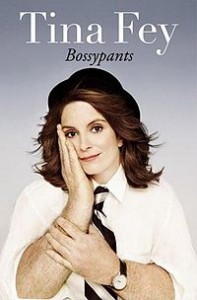The title is Bossypants, but it could have easily been called Smartyhead. Comedian Tina Fey is a funny woman. Maybe a little smart-alecky, but that’s what we expect of comedians. She’s obviously a bright woman. Maybe it could have been called Smartypants.
She had a lot to say when she sat down to write.
Just short of two-hundred pages into the book, Ms Fey addresses her readers on a subject, and then presumably realized that her public isn’t necessarily comprised exclusively of women. She compares applying her newly bought contact lenses to activities required by feminine hygiene products.
“If you are male,” she writes, “I would liken it to touching your own eyeball and thank you for buying this book.”
Since I am a male reader, I appreciated the recognition while bearing up under her condescension – not that I particularly cared to visualize the analogy she had offered to women readers. I think I caught the drift of it. But I’m guessing she didn’t expect men to read the book.
It’s for the most part entertaining, as would be expected from a comedian. Humor isn’t the sole focus though, and that’s where it bogs down a little, particularly for the men. Birthday party planning, breast feedings, bad dates. I wasn’t looking for slapstick, but I was caught off-guard by some of the contents.
There is a how-to section regarding comedy performance. I guess there are up-and-coming comedians who might read the book for insights in honing the funny-skills. Personally, the guidelines for improvisation are wasted on me. I don’t see myself – near future or long-term – trying out a humor routine in front of an audience.
Similarly, the topics she covers in the space given to her Boss experiences have already been covered in greater detail by business management and human relations authors. Her insights are interesting, but seem wedged in and slightly out of place in a memoir (That’s how the book is categorized on the back cover).
Bossypants speaks to female equality, maternal issues, and Oprah. ESPN is not mentioned once. Therein lies the appeal – or lagging interest – depending on perspective. (I didn’t really expect sports jokes. There are some places that might have benefited by the inclusion of one or two as a distraction from the strict female orientation.)
Still, Bossypants is a quick and easy read, offering plenty of familiar cultural references. Some of the funniest lines are those throw-away types:
Two peanuts were walking down the street and one was a salted.
That’s her token joke, one she says she included for book buyers expecting a humorous read.
I guess that is enough for me.
